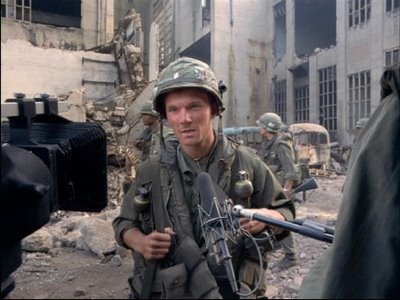 With the news today and everyday for that matter about our troops in Iraq, I decided to go "digging in the creates" for an old war story eerily similar to what I was reading in my NY Times over my Venti mocha:
With the news today and everyday for that matter about our troops in Iraq, I decided to go "digging in the creates" for an old war story eerily similar to what I was reading in my NY Times over my Venti mocha:War Has No Rules for Russian Forces Fighting in Chechnya
Troops admit committing atrocities against guerrillas and civilians. It's
part of the military culture of impunity, they say. They call it bespredel--literally, "no limits." It means acting
outside the rules, violently and with impunity. It translates as "excesses"
or "atrocities."
Chechnya = Iraq
"What rules? What Geneva Conventions? What difference does it make if
Russia has signed them?" said a 25-year-old army officer. "I didn't sign
them, none of my friends signed them. . . . In Russia, these rules don't
work."
Russia has signed them?" said a 25-year-old army officer. "I didn't sign
them, none of my friends signed them. . . . In Russia, these rules don't
work."
About a dozen Marines from the 3rd Battalion, 1st Marine Regiment, 1st Marine Division, are being investigated for war crimes in connection with the incident to determine if they violated the rules of military engagement.
Perhaps most important, the servicemen described a pervasive and
powerful culture of impunity in the Russian armed forces. They believe that
authorities say one thing in public but deliberately turn a blind eye to
many war crimes. A few even said investigators helped cover up such
atrocities. Right or wrong, the soldiers are confident that authorities
will make no serious effort to investigate war zone misconduct.
"You don't make it obvious, and they don't look too hard,"
The military at first described the encounter as an ambush during a joint U.S.-Iraqi patrol that involved a roadside bombing in which a Marine died and then a firefight. However, residents of the neighborhood contended that only U.S. forces were shooting after the explosion.
The report concludes that a dozen Marines acted improperly after a roadside bomb explosion killed a fellow Marine, Lance Cpl. Miguel Terrazas. Looking for insurgents, the Marines entered several homes and began firing their weapons, according to the report.
Killing for Revenge
"When you see your mates drop down on the ground, when you take your
dead and wounded to the hospital, this is when hatred rises within you,"
said a 23-year-old army officer. "And the hatred is against all Chechens,
not just the individual enemies who killed your friends. This is when
bespredel starts."
Notions of provocation and revenge are central to the servicemen's
mind-set. In Russian culture, a man not only has the right but is also
honor-bound to respond to a "provocation." When a Russian serviceman is
killed or mistreated by the enemy, his comrades must take revenge.
Nearly all of the servicemen who recounted incidents of bespredel--a
slang term that originated in Russia's prisons--described them as revenge
attacks for the deaths of their comrades.
mind-set. In Russian culture, a man not only has the right but is also
honor-bound to respond to a "provocation." When a Russian serviceman is
killed or mistreated by the enemy, his comrades must take revenge.
Nearly all of the servicemen who recounted incidents of bespredel--a
slang term that originated in Russia's prisons--described them as revenge
attacks for the deaths of their comrades.
"When you see your mates drop down on the ground, when you take your
dead and wounded to the hospital, this is when hatred rises within you,"
said a 23-year-old army officer. "And the hatred is against all Chechens,
not just the individual enemies who killed your friends. This is when
bespredel starts."
Notice the parallels of War? Chechnya, Iraq, Africa, Vietnam, Somalia, Kosovo. In the end are the professionalism and standards of our nations armed forces doomed to the conditions of man and his inability under extreme conditions to maintain whatever shreds of emotional intelligence happen to remain?
Content Sources:
WAR HAS NO RULES
Probe finds Marines
FULL METAL JACKET
CDI (Center for Defense Information)
Content Sources:
WAR HAS NO RULES
Probe finds Marines
FULL METAL JACKET
CDI (Center for Defense Information)
"Anyone who runs is VC. Anyone who stands still is well-disciplined VC ..."
Naro%
